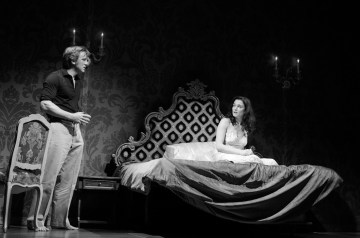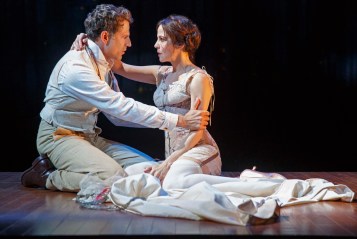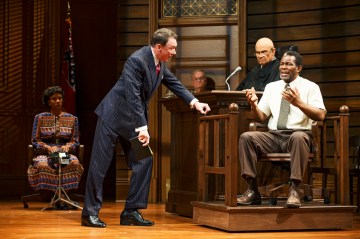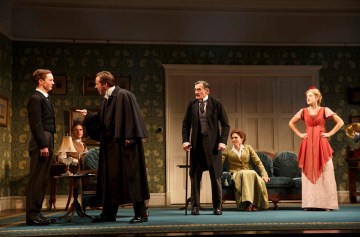TIME’s theater critic reviews four new productions that have landed on Broadway: Betrayal, The Snow Geese, A Time to Kill, and The Winslow Boy.
.
Betrayal
Two famous stars — Daniel Craig, the movies’ James Bond, and his real-life wife, Rachel Weisz — plus a pre-opening ad blitz surpassing anything yet seen on Broadway, have combined to make Betrayal the hottest new play of the fall. It’s not new, of course, having been written by Harold Pinter in 1978 and produced twice before on Broadway, but still outclasses any of the originals to come along this fall (see below). It’s a tale of adultery told backward in time: Weisz is the unfaithful wife, Craig her book-publisher husband, and Rafe Spall the wife’s lover and husband’s best friend. The time reversal is more than just a gimmick: it removes the suspense from a familiar, even clichéd storyline (will they be found out?) and replaces it with the tension of trying to figure out the degrees of deception and dissembling that have helped foster the affair (who knew what, and when?). Director Mike Nichols keeps the mood somber and the pace deliberate, leaving plenty of room for those famous Pinter pauses. In truth, the mystery and menace are relatively muted for Pinter, and there’s a certain safeness in hiring Nichols, Broadway’s most bankable director, to direct a couple of movie stars in what is probably the playwright’s most conventional and crowd-pleasing drama. Yet Craig and Weisz are excellent, Spall even better, and it’s a sleek, taut and spellbinding evening.
(Ethel Barrymore Theater, through January 5)
.
The Snow Geese
Playwright Sharr White made his Broadway debut last season with The Other Place, a sharply written, if sometimes hard to watch, drama about a woman succumbing to dementia. White’s new play, The Snow Geese, is hard to watch for different reason: it’s a snooze. The year is 1917, and we’re in the upstate country home of a New York family whose patriarch has recently died. One son is preparing to go off to war, the other is trying to get the family to realize it is broke, while their mother, in between drafts of laudanum, simply wants to carry on the family’s annual shooting party. The picture of enervated, early-20th-century landed gentry seems intended to conjure up Chekhov. But there’s too much free-floating symbolism (the title geese), strands of undigested social commentary (a German-born brother-in-law has lost his medical practice because of anti-German xenophobia) and a weak central performance by Mary-Louise Parker, who seems too young, too callow and too contemporary to be remotely convincing as the mother. Pass the laudanum.
(Samuel J. Friedman Theater, through December 15)
.
A Time to Kill
One genre of play that has all but disappeared from Broadway is the old-fashioned courtroom melodrama — the sort of pulpy entertainment geared for theatergoers who have no patience for Pinter or Chekhov. A Time to Kill, a stage version of John Grisham’s 1989 bestseller, suggests one reason why: Broadway has no feel for them any more. Grisham’s story, about a black man in Mississippi put on trial for murdering the two white men who raped his daughter, is full of stereotypes and simplistic morality, but that doesn’t excuse the ineptness of this adaptation by Rupert Holmes, directed by Ethan McSweeny. Every character seems like a faded photocopy of a photocopy: the young, crusading public defender (Sebastian Arcelus), his inexperienced but earnest Girl Friday (Ashley Williams), an oily, politically ambitious district attorney (Patrick Page), the alcoholic ex-attorney (Tom Skerritt) who stops drinking long enough to offer sage counsel. The courtroom theatrics are so manipulative and implausible they would make Perry Mason blush. Worse, even the victim-turned-murderer (John Douglas Thompson) seems so willfully clueless about the legal implications of his crime that he actually becomes unsympathetic. Verdict: mistrial.
(John Golden Theater)
.
The Winslow Boy
If A Time to Kill is a drama of southern justice in which we never leave the courtroom, Terence Rattigan’s The Winslow Boy is the story of a British court case in which we never set foot in one. When his 13-year-old son is expelled from a military academy for petty theft, a stuffy London banker decides to pour all his resources and prestige into winning the boy’s exoneration. The case turns into a national sensation and a personal obsession that all but destroys the family. Rattigan, the popular mid-century British playwright enjoying something of a revival, was known for his old-fashioned “well-made” plays. But what’s intriguing about The Winslow Boy is how ungainly it often seems, with multiple subplots, many of the key scenes taking place offstage, and an odd shift in focus halfway through — from the crusading father, played by Roger Rees, to the renowned barrister (Alessandro Nivola) he hires to handle the case. Lindsay Posner’s production, imported from London’s Old Vic Theatre, hits a few wrong notes, and Rees doesn’t project the kind of angst one would expect from a man who knows he’s driving his family to ruin. Still, it’s a satisfying reminder of Rattigan’s gifts.
(American Airlines Theater, through December 1)





